Bio-Based Nanocrystals Combat Oil Pipeline Scaling While Stabilizing Emulsions
Penn State University researchers have developed a nanoparticle solution to address two critical challenges in oil extraction processes: calcium carbonate scaling in two-phase systems and water-in-oil emulsion stability, according to a news release.
The nanoparticles could have substantial implications for process equipment handling water-oil emulsions, particularly in preventing operational damage and safety hazards associated with mineral buildup in pipes and equipment. This is especially relevant in enhanced oil recovery operations where maintaining emulsion stability while preventing scaling is crucial.
“We aimed to tackle the challenge of calcium carbonate formation, known as scaling, in two-phase oil-water systems, dealt with in numerous water-based industries, such as oil and gas sectors,” said corresponding author Amir Sheikhi, associate professor of chemical engineering and the Dorothy Foehr Huck and J. Lloyd Huck Early Career Chair in Biomaterials and Regenerative Engineering.
The team engineered two types of cellulose-based nanoparticles:
1. Anionic hairy cellulose nanocrystals (AHCNC) - demonstrated anti-scaling capabilities but couldn't stabilize emulsions
2. Amphiphilic hairy cellulose nanocrystals (AmHCNC) - achieved both anti-scaling properties and emulsion stabilization via the Pickering mechanism
The innovation is particularly significant because current anti-scaling solutions either have negative environmental impacts or are limited to single-phase aqueous systems. The new AmHCNC technology represents a breakthrough in addressing both challenges simultaneously while being bio-based and environmentally safe.
The research team is currently seeking industrial partners to test the technology in real-world conditions, particularly in enhanced oil recovery applications. They're also exploring potential applications in other industries where water-oil emulsions are common, such as cosmetics and food processing.
The research was published in ACS Applied Materials & Interfaces and was partially funded by the American Chemical Society Petroleum Research Fund.
